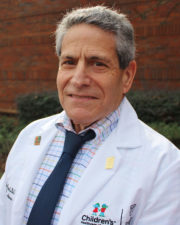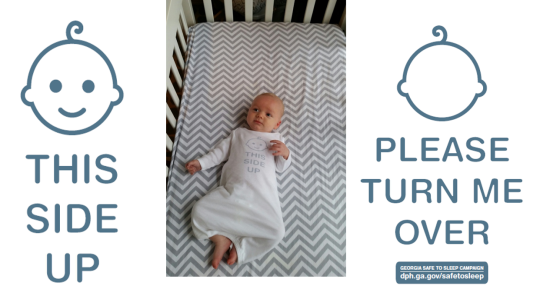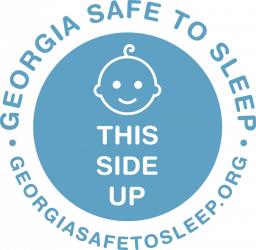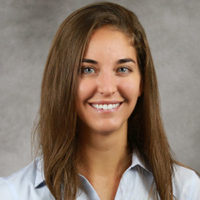Georgia has one of the highest infant mortality rates in the country. Of preventable infant deaths, most are sleep-related, the GBI says.
“The biggest problem is not only not sleeping on their back, but also bed-sharing,” said Dr. Gary Freed, longtime director of the Children’s Healthcare of Atlanta apnea center. “We are losing babies who shouldn’t be lost; most of these [deaths] could be prevented.”

Most sleep-related deaths are caused by accidental strangulation due to parent-baby bed sharing, blocked airflow in a baby sleeping on his or her stomach or side, or other sleep-related risk factors, according to the GBI. Sudden unexpected infant death (SUID) kills 3,500 babies a year nationally, and that includes sleep-related deaths.
The American Academy of Pediatrics (AAP) has long urged parents to follow the “ABC’s” when getting their newborns to sleep. The infant should sleep Alone, on its Back, in a Crib.
Survey shows more awareness
A recently published study set out to test whether better education might help increase parents’ knowledge of safe sleep, change their behavior and reduce risk.
Using a statewide survey sent to all Georgia parents of recently discharged infants over a three-month period in 2016, 90 percent of respondents knew proper sleep positions, and 85 percent knew the recommended location, according to the University of Georgia study.

The data suggest that receiving information in the hospital was significantly correlated with safe sleep behavior, which likely influenced overall safe sleep practices, according to the research.
Almost all survey respondents reported getting at least some ABC education in the hospital, and 79 percent said they received Georgia’s Department of Public Health safe sleep education, the UGA study found.

The study followed up on a Public Health Safe to Sleep initiative launched in 2016. The department partnered with all 78 Georgia birthing hospitals to provide a three-pronged intervention to teach safe sleep practices. Public Health partnered with the American Academy of Pediatrics, the GBI, the Georgia Hospital Association and other state organizations to execute the program.
Infant mortality data and parental surveys suggest parents aren’t always following the recommendations.
In 2013, 43 percent of Georgia parents said they always put their infants on their backs, down from previous years. But 49 percent said they never bed-share, which is encouragingly higher than previous years, according to Public Health.
The question remains whether parents know about the recommendations and are not able or willing to execute them, or if parents are not learning safe sleep tactics to begin with.
In the study, 89 percent of respondents reported usually putting their infant to sleep on his or her back. Though the respondents were geographically representative of births throughout the state, the sample size was less than 5 percent of all births and tended to be less diverse than Georgian parents as a whole.
While SUID rates are down since the 1990s, racial disparities persist, according to the CDC.
Still a lot to learn
UGA researcher Becka Walcott says more research is needed to figure out the correlation between education, behavior and other factors — but that this study is a good step in understanding more about Georgia parents’ understanding of safe sleep.

“It’s not a representative sample [of all infant caretakers], but we did have very high knowledge and risk reduction behavior and that’s encouraging,” said Walcott, who is part of an economic evaluation research team at UGA’s College of Public Health.
The study surveyed 420 caretakers, a third of whom received Medicaid. Overall, Medicaid covers more than half of births across the state, but 68 percent of sleep-related deaths occur in families receiving Medicaid.
In 2016, 976 infants died in Georgia — the seventh most in the country, but down from 1,159 deaths in 2005, according to the CDC. Per capita, the state ties for sixth-worst with Ohio, both seeing 7.5 deaths per 1,000 live births. Alabama has the most deaths per births and Vermont the fewest.
Public Health’s Safe to Sleep program wants to end preventable sleep-related deaths by educating every primary caretaker, including parents and extended family, with tools and resources. As a part of the program, DPH and other agencies partnered with birthing hospitals to give out board books detailing recommended sleep positions, and gowns for infants stamped with a “this side up” diagram.
“Implementation of a statewide hospital initiative was associated with high levels of parental knowledge and behavior and may have been successful in reducing the practice of bed sharing among Medicaid parents,” the study says.
The program goes a step further and provides free sleeping bassinets to parents receiving Medicaid benefits to promote solo sleeping. The study found that Medicaid recipients who received a bassinet in the hospital were 74 percent less likely to bed-share.

Fifty-seven hospitals have fully implemented rollout, giving books and gowns to every parent, and bassinets to parents who receive Medicaid benefits. Twenty-one are still finalizing steps. And while a few have chosen to opt out of one or more pieces of the intervention, all birthing hospitals give at least some safe sleep education, Public Health says.
SUID expert Freed says providing the bassinets can go a long way in promoting safe sleep — especially among families that cannot afford a crib. The important thing is to get the baby alone, on their back, in a four-cornered small space, he said.
“It’s a great program,” he said. “In New Jersey they give out cardboard boxes, and I’ve told parents, ‘If nothing else, you can take out a drawer [from a dresser] and use that for the first few months’.”
But it’s also important to get to the parents before and after the birth, not just at the hospital, says Freed, who currently teaches at Philadelphia College of Osteopathic Medicine in Suwanee and recently retired from Emory School of Medicine.
Freed says because this program partnered only with birthing hospitals and not with children’s hospitals, it misses opportunities to educate new parents and family caretakers in intensive care units and follow-up appointments.
“It’s still not getting to nurseries,” Freed said of safe sleep messaging. He says the ABCs need to be heralded as the mantra by both birthing and children’s hospitals, as well as at churches, pediatrician offices and obstetrician visits before and after births. “Pediatricians know the messaging, but most of the time it’s not brought up because they only have 10 minutes and that time is not spent teaching,” said Freed, who worked as a general pediatrician before specializing in intensive neonatal care.

Public Health’s program rolled out a statewide PSA campaign as well. Safe to Sleep program coordinator Terri Miller says part of the strategy is to educate not only caretakers, but statewide healthcare providers as well, who often don’t know the brunt of the problem.
“In coordinating this program, we learned that many hospital employees working in women’s services didn’t know the data around infant sleep-related deaths,” she said. “Our goal is for all health professionals that have contact with families, including emergency department personnel, EMS, pediatricians, are aware of the infant death data and the recommendations on how to best prevent these deaths.”
UGA’s Walcott says some survey respondents just wanted to talk about the intervention and how helpful the gown is, she said, while some appreciated the reminders of the importance of safe sleep practices.
Miller agrees and says DPH hopes to extend the program soon, and she is encouraged by positive feedback. “We have also received pictures from new parents who have posted to social media showing their babies on their backs in the “This Side Up” gowns,” she said. “So we know our message is being heard.”
Erica Hensley is a freelance health care journalist based in Athens.

